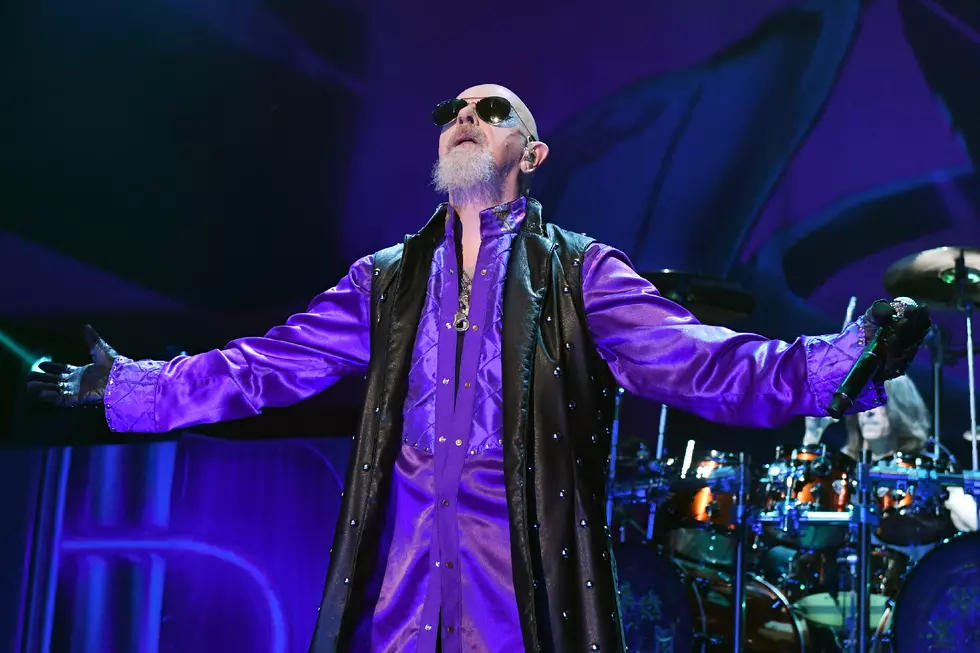
Rob Halford’s ‘Screaming for Vengeance’ Lyrics Were ‘A Miracle’

Rob Halford reflected on writing his lyrics for Judas Priest's 1982 album Screaming for Vengeance while enjoying all the indulgences available on the Spanish island of Ibiza.
The band’s breakthrough record was released 40 years ago this month, after a difficult gestation period during which it worked in multiple locations over two distinct time periods.
“I’m proud of the lyrics on that album,” Halford told Grammy.com in a new interview. “Combined with all the booze and drugs and partying, it's an absolute miracle that I was able to pick up the pencil to start, in a haze of partying all night.”
“There were a number of things that took us there," he noted of Ibiza. "But it's magical. We still have this beautiful relationship with everything Spanish. It's very much like a Shangri-La, you know? For artistic purposes, it can be just a fantastic place to generate ideas, whether you're a musician or a painter, or whatever it might be. For creative people, there's just something magical about the island.”
Bassist Ian Hill agreed that Ibiza presented “multiple distractions” for the group and its producer, Tom Allom. “It fitted perfectly with Tom Allom’s style, the laid back, take your time over it, patience with it — all of that,” Hill said. “If you were in the studio, and you'd been at something all day, there's no point in continuing to try and do it. Go off and play a round of golf, go swim in the pools, and then come back to it. You'll come back with a different attitude. It was perfect for Tom and for ourselves really. You've got to be in the right frame of mind.”
He continued: “Ibiza is one of those places. Around the edges it's very commercialized, but you get to the interior of the island, it's like stepping back 200 years, you know? He just gave us that little bit of leeway. A little bit of leisure, if you like. It put us in a great frame of mind.”
Judas Priest worked with Allom for a decade – but Hill recalled the band members had been unsure of him when the idea was suggested, since they came from the British industrial city of Birmingham and the producer had a higher-class background. “Although we come from different ends of the social spectrum, we did gel with him pretty quickly,” the bassist recalled. “The first time we met him, we were all thinking, ‘Who the hell is this?’ He was this very plummy-voiced, obviously upper middle class lad who didn’t know anything about heavy metal.
“About an hour later in the pub, we’d had a few drinks and were getting on like a bonfire. And it went from there. The first thing he did was mixed the Unleashed In The East live album. He did a tremendous job on that, and then we carried on from there.”
Allom recounted: “I went to a posh school, a private school. … I ended up at the University of St. Andrews, except it wasn’t in St. Andrews [an upper-class Scottish town with royal connections]. I went for engineering, and the engineering faculty was in Dundee… a very rough town, really rough. I lived there for three years.”
The producer accepted he couldn’t have worked with Priest without the “rough edges” he acquired during those years. “I could think, ‘Okay, you guys are from Birmingham, but I have lived three years in Dundee which makes Birmingham look like bloody Bond Street in London,’" Allom explained. "And it didn’t bother me that they thought I was posh. By the time we'd finished doing the Unleashed album [in 1979], we were getting along really well. Rob liked working with me, and I think they all did really. That's why they asked me to do British Steel. And by then they got over the fact that I was posh.”
The Best Song From Every Judas Priest Album
More From US 103.1 FM









